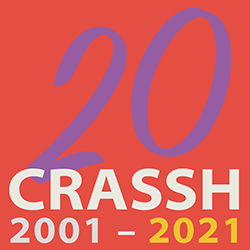| 13 Apr 2021 - 15 Apr 2021 | All day | ONLINE | |
- Description
- Programme
- Call for Papers
Description
Sign up to the CRASSH Newsletter for more information and updates on this conference.
Lead Convenor
Sian Lazar
Speakers
Callum Cant: Editor notesfrombelow.org, Author Riding for Deliveroo (Polity Press, 2020)
Mary Gray (Microsoft Research and Harvard University): ‘Co-Author Ghost Work: How to Stop Silicon Valley from Building a New Global Underclass’ (Houghton Harcourt, 2019)
Alexandrea Ravenelle (University of North Carolina)
Alex Wood (Birmingham Business School, University of Birmingham)
Summary
Digital platforms are increasingly important forms of organising work today, from the physical labour of driving, delivery, cleaning and other tasks – organised through platforms like Uber, Lyft, Deliveroo, Instacart etc., to freelance digital labour through sites like UpWork, Amazon Mechanical Turk, Fiverr. Sites connect clients to workers, organise payment, and take commission, while mostly seeking to avoid the responsibilities that an employer might have to employees. This conference seeks to explore the politics and ethics of this way of organising labour from the perspective of the lived experience of the workers themselves. We will focus especially on qualitative and ethnographic work on how people feel about their own labour situation, how they build their own networks, what they consider to be the most important aspect of this new way of working, and how it fits with their lives and values. We hope to attract a broad range of activists, social scientists, social theorists and philosophers of platform capitalism to this conversation.
Drawing on this conversation and beginning from the perspective of those doing the work, we aim to identify some of the key political and ethical questions associated with this form of labour today. Such questions might include: what is the appropriate relationship between worker, client and employer? Does the platform itself dictate that relationship? Does it make exploitation easier than conventional employment forms, or even inevitable? Could there be principals of design that would mitigate against that? What is the role of regulation in reality, and what could its role be? What is it that workers like about platform labour? How do they evaluate their own conditions, and how would they like them to improve? What are the social networks that workers develop around these forms of labour, and how does it fit together with their daily lives, hopes, values and family situations? What are the possibilities for collective action? How have all of these been affected by the Covid-19 pandemic?
Registration links for this conference can be found on the right of this page.
Supported by:


 #platformlabour
#platformlabour
If you have any specific accessibility needs for this event please get in touch. We will do our best to accommodate any requests.
Conference assistance: events@crassh.cam.ac.uk
Programme
PLEASE NOTE YOU CAN BOOK FOR MORE THAN ONE DAY
|
|
| 12.30 - 14.00 (BST) | Aditi Surie, University of Cape Town Title: Staying on the Platform: Worker-Identified Reasons to Continue Platform Work in Bengaluru, India
Niels van Doorn and Darsana Vijay (University of Amsterdam) Title: Digital Migration Infrastructure: Constructing a Platform-Governed Migrant Division of Labor?
Moritz Altenried and Manuela Bojadzijev (Humboldt-Universität zu Berlin) Title: Migration and the Gig Economy: Platforms, Labour and Mobility in Berlin |
| 15.00 - 16.00 (BST) | Alexandrea Ravenelle (University of North Carolina) Title: Risk Society and Gig Economy: Turning to the ‘Side Hustle Safety Net’ During COVID-19 Chair: Rebecca Prentice, University of Sussex |
| 16.30 - 18.00 (BST) | Lorena Caminhas (State University of Campinas) Title: Digital Platforms in the Brazilian Sex Markets: an Intricate Field to Investigate Platforms’ Labour Dynamics
Mariya Ivancheva (University of Liverpool) and Jesica Lorena Pla (Universidad de Buenos Aires) Title: Re/Defining ‘Essential Work’: The COVID-19 Pandemic and High-Skilled Venezuelan Migrants in Argentina’s Platform Economy
Maurizio Atzeni (Centro de Estudios e Investigaciones Laborales CEIL/CONICET, Argentina) and Francisca Gutierrez Crocco (Universidad Alberto Hurtado/COES, Chile) Title: Between Precarization, Algorithmic Control and Mobilization. The Effect of the Pandemic on Platform Delivery Workers in Argentina and Chile. Chair: Juan del Nido, University of Cambridge |
| 10.00 - 11.30 (BST) | Wanjing (Kelly) Chen (Hong Kong University of Sicence and Technology) Title: Petty Commodities and Algorithmic Lore: How Subaltern Livestreaming Anchors Survive Platform-based Marketing Work in the Late-Covid China
Louisa Shen (University of Cambridge) Title: The Exploitation in Automation: Sensorial Labour and Computer Vision
Paola Tubaro (Centre National de la Recherche Scientifique) Title: Differential Pathways to Technology Jobs: The STEM Gender Gap in Online Labour Platforms Discussant/Chair: Eeva Kesküla , University of Tallinn |
| 12.00 - 13.00 (BST) | Alex Wood (University of Birmingham) Title: Platform Precarity: Surviving Algorithmic Insecurity in the Remote Gig Economy Chair: Sian Lazar, University of Cambridge |
| 16.00 - 17.00 (BST) | Q&A Session with Mary Gray (Microsoft Research and Harvard University). Co-Author ‘Ghost Work: How to Stop Silicon Valley from Building a New Global Underclass’ (Houghton Harcourt, 2019) Chair: Sian Lazar, University of Cambridge |
| 17.30 - 19.00 (BST) | Brian Justie (UCLA) Title: CAPTCHA, reCAPTCHA, and the Aesthetics of Platform Capitalism
Milagros Miceli (Weizenbaum Institute & TU Berlin) and Julian Posada (University of Toronto) Title: The Politics of Data Production in Machine Learning
Rafael Grohmann (Unisinos University / DigiLabour Research Lab) Title: Human Bots: The Work of Brazilians on Click Farm Platforms Between Fake Accounts and Bots Chair: Ilana Gershon, Indiana University |
| 10.00 - 11.30 (BST) | Gayatri Nair (Indraprastha Institute of Information Technology Delhi) Title: Between Precarity and Autonomy; Reconfiguring Risk and Responsibility in the Gig Economy in India
Valentin Niebler (Leuphana University) Title: Evade, Deceive, Unite: Worker Power Through Costumer Coalitions on Digital Platforms
Morgan Rhys Powell (University of Manchester) Title: The Network Makes Us Strong: Alternatives to the Union Form Amongst Organised Platform Couriers Chair: Andrew Sanchez, University of Cambridge |
| 12.00 - 13.00 (BST) | Q&A Session with Callum Cant: Editor notesfrombelow.org, Author ‘Riding for Deliveroo‘ (Polity Press, 2020) Chair: Sian Lazar, University of Cambridge |
| 14.00 - 15.30 (BST) | Simiran Lalvani (University of Oxford) Title: Delivering After Dusk: Examining Temporalities of App-Based Food Delivery Work in Mumbai, India
Kaveri Medappa (University of Sussex) Title: Making Life: Aspirations, Commitments and Entrapments in Platform-Based Driving and Food Delivery Work in Bangalore
Katrine Duus Terkelsen (Aarhus University) Title: Riding for Freedom and Flexibility: Moral Economies of Digital Platform Work in Brussels Chair: Kriti Kapila, King’s College London |
Poster Presentations |
|
Nicola Ens (Copenhagen Business School)
|
Call for Papers
Call for Papers
Digital platforms are increasingly important forms of organising work today, from the physical labour of driving, delivery, cleaning and other tasks to freelance digital labour. Sites connect clients to workers, organise payment, and take commission, while mostly seeking to avoid the responsibilities that an employer might have to employees. New forms of profit and remuneration have come into being, shaping workers’ experience and livelihoods in multiple and changing ways. Via platforms like Uber, Lyft, Instacart or Deliveroo, workers and clients come into direct contact on city streets or in people’s homes, and there have been some recent attempts to engage politically to improve labour conditions; as well as reactions from the firms themselves. Another main form of platform labour is digital labour, from the ‘ghost work’ that drives contemporary AI and machine learning systems to the freelance personal assistance, translation, analysis, processing, writing, designing and editing of web-based data, available through sites like UpWork, Amazon Mechanical Turk, Fiverr.
The conference seeks to explore the politics and ethics of these ways of organising labour from the perspective of the lived experience of the workers themselves. We hope to attract a broad range of activists, social scientists, social theorists and philosophers of platform capitalism to this conversation and especially invite papers that focus on qualitative and ethnographic research with platform workers.
We are particularly interested to hear from students and early career researchers.
Papers might address questions such as (but not limited to):
- What is it that workers like and dislike about platform labour? How do they evaluate their own conditions, and how would they like them to improve?
- Are there specific classed/gendered/racialized experiences that mark different types of platform work?
- What are the social networks that workers develop around this form of labour, and how does it fit together with their daily lives, hopes, values and family situations?
- Are new forms of social or geographical mobility enabled by platform labour?
- What are the possibilities for and limitations to collective action (including legal action)?
- What is the moral economy of platform work? Are platform workers developing new mechanisms of self-regulation and new technologies of individual and collective resistance?
- What is the appropriate relationship between worker, client and employer? Does the platform itself dictate that relationship?
- Do platforms make exploitation easier than conventional employment forms, or even inevitable? Could there be principals of design that would mitigate against that?
- What is the role of regulation in reality, and what could its role be?
- How have these questions been affected by the Covid-19 pandemic? With some platform labourers becoming ‘essential’ workers, while new workers join digital platforms as their analogue employment prospects contract, how has the pandemic changed the experience of platform labour and the possibilities for its future?
If you would like to present a paper, please submit abstracts of 300 words by 1 February 2021 using this form.
The conference will be held online in April 2021, but we plan to hold an in-person meeting of some or all of the speakers in Cambridge later in the year, for which travel bursaries will be available.
We are grateful to CRASSH, the Max-Cam Centre and the EASA Anthropology of Labour network for support.



